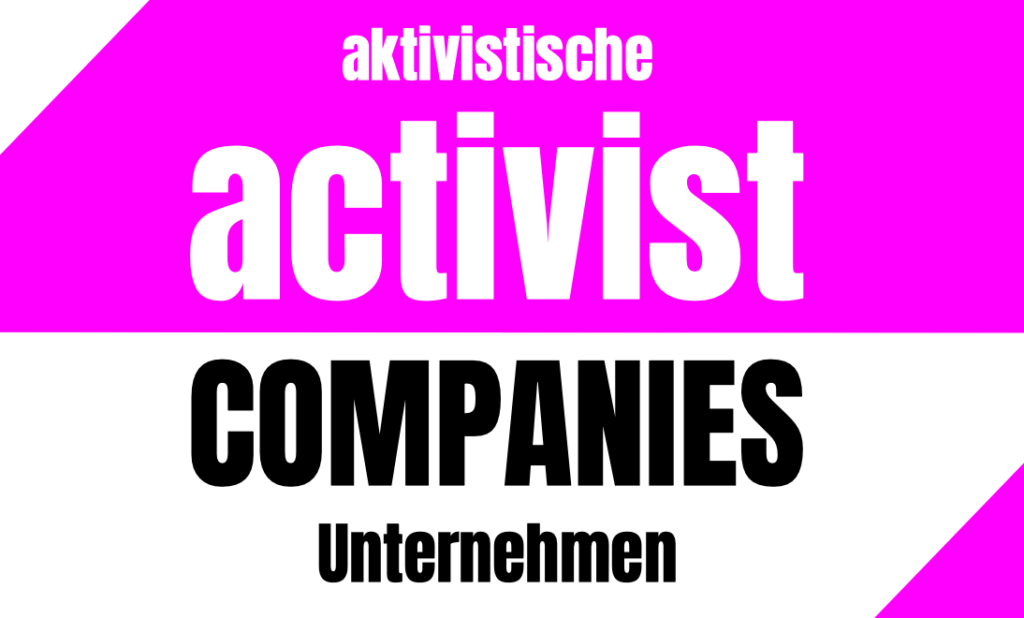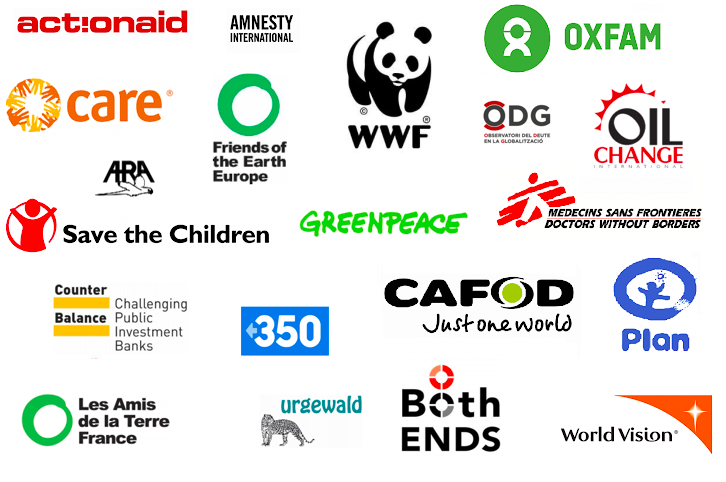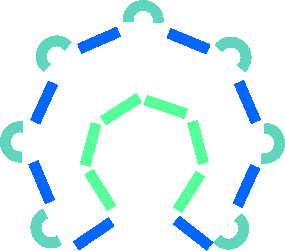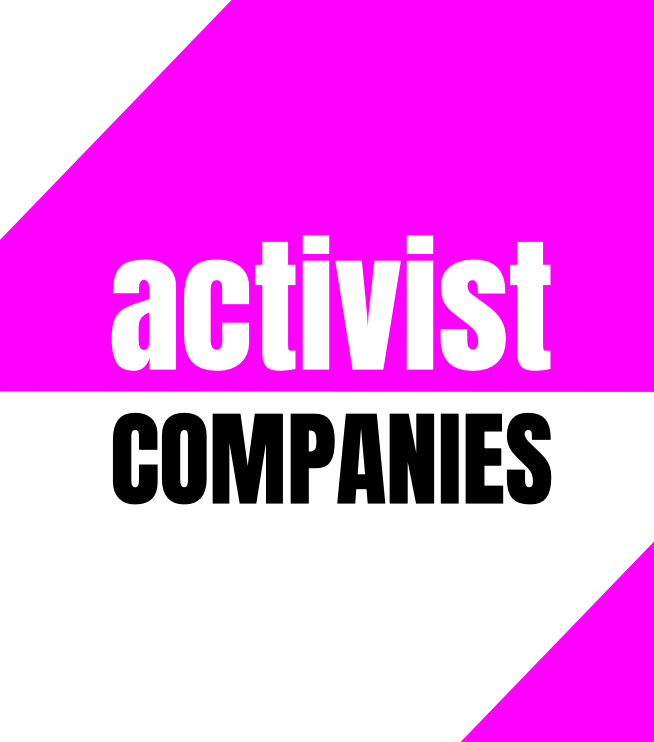META
TITEL: Aktivistische Unternehmen
WAS: Artikel
FÜR: SELF, OPEN!NEXT
–
English version below ↓
–
Aktivistische Unternehmen
Manche Unternehmen agieren aktivistisch. Gut! Wir brauchen viel mehr davon für einen nachhaltigen, klimafreundlichen Umbau unserer Wirtschaft. Seid aktivistisch!
*
↓ Klicken zum Öffnen
Ich bin Teil eines größeren europäischen Forschungsprojektes größeren europäischen Forschungsprojektes zum Thema Open Source-Hardware und Unternehmen. Eine Schlüsselfrage dabei ist, welche Unternehmen man anspricht und wie?
Open Source-Hardware ist ein guter Weg, um positiven Impact zu erzeugen und zugleich ein profitables Geschäft aufzubauen. Wenn es aber um aggressives Wachstum, Monopole und außerordentliche Reichtums- und Machtgewinne geht, dann ist Open Source nicht das überzeugendste Kind in der Badewanne. Wer hauptsächlich solcher Motive wegen ein Unternehmen führt, wird sich kaum von Open Source überzeugen lassen und sich lieber anderen Strategien zuwenden. Open Source braucht besondere Fähigkeiten und Anstrengungen. Gelingt es aber, dann wird man nicht mit extremen finanziellen Gewinnen belohnt, wie vielleicht andere mit vergleichbaren Anstrengungen.
Aber glücklicherweise gibt es viele UnternehmerInnen, die nicht allein von Reichtum und Macht motiviert sind. Sie arbeiten zum Beispiel auch für eine gerechtere oder nachhaltigere Welt. Unternehmertum ist ihr Mittel dafür oder die Plattform, die sie dafür nutzen. Manche gehen mit diesem Anspruch sogar soweit, dass man sie als schon “aktivistische UnternehmerInnen” bezeichnen kann.
Und diese sind es, die unser Forschungsprojekt ansprechen sollte. Sie sind vielleicht motiviert, die Extraanstrengungen von Open Source auf sich zu nehmen, weil die kollaborative Kraft von Open Source für die Erreichung ihrer Ziele den effektiveren Weg bietet. Diese Unternehmen sollte unser Forschungsprojekt finden und adressieren. Oder es sollte darauf zielen, Unternehmen zu solchen Unternehmen zu machen.
Und weil ich diese Meinung vertreten habe, wurde ich gebeten, mal genauer zu erklären, was ich damit meine. So ist dieser Text entstanden, der aber über die Fragen unseres Forschungsprojektes weit hinausgeht.
↓
–
Aktivistische Unternehmen?
Was sind aktivistische Unternehmen? Es sind Unternehmen, die manchmal wie AktivistInnen agieren. AktivistInnen sind frei nach Wikipedia Personen, “die mit besonderen Leistungen politische oder gesellschaftliche Ziele fördern z.B. solche der Wirtschafts-, Umwelt- oder Sozialpolitik.” (Quelle) Es geht dabei immer um Veränderungen, entweder sollen sie herbeigeführt oder abgewendet werden.
(Auf die Bilder klicken zum Vergrößern.)

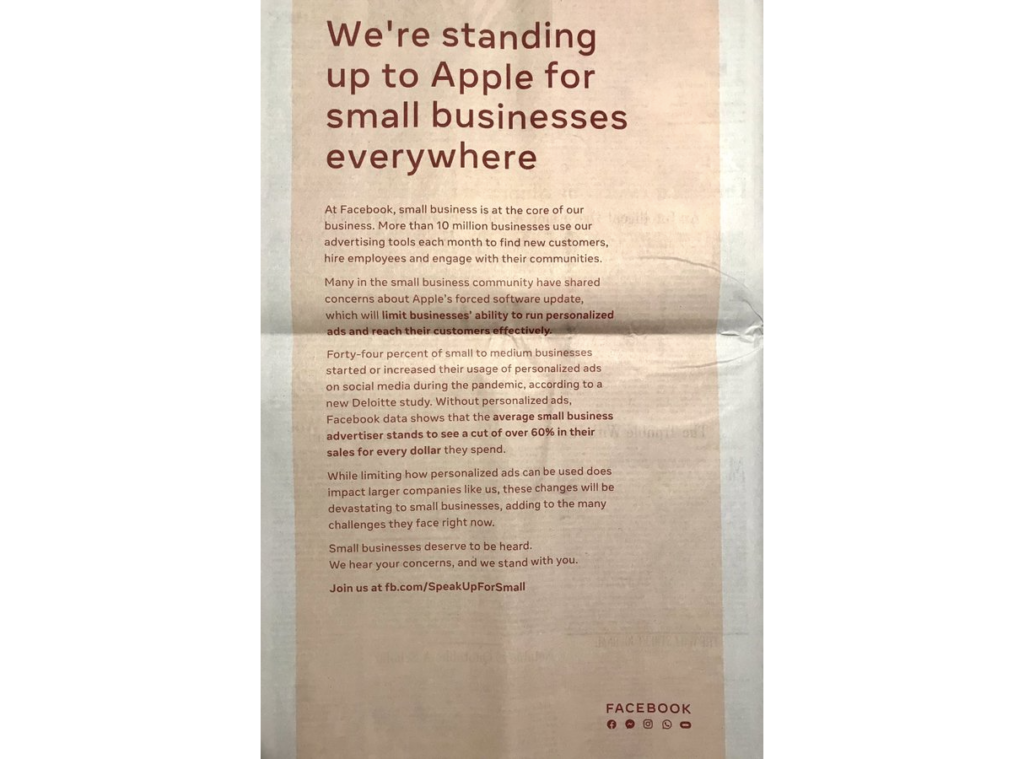
!
So gesehen, agieren viele Unternehmen aktivistisch.
Zum Beispiel wenn sie für bestimmte Lebensentwürfe werben (“Autofahren ist cool”, “Vegan essen ist gesund”, “Nachhaltig produziert ist gut!”), oder weil sie sich in Verbänden organisieren und dort politische Ziele formulieren und verfolgen, oder weil sie auch direkt offene Kampagnen fahren (siehe Bilder oben).
Wenn in Brüssel BürgerrechtlerInnen und Unternehmens-vertreterInnen die selben EU-Abgeordneten belagern, dann nennen wir die einen Aktivisten und die anderen Lobbyisten, aber beide machen im Grunde exakt das gleiche. Die Unterschiede sind jedenfalls gering.
Aktivistische Unternehmen versuchen unsere Gesellschaft politisch zu gestalten. Prinzipiell gestaltet jedes Unternehmen unsere Gesellschaft mit durch seine Waren oder Dienstleistungen. Aktivistische Unternehmen gehen aber darüber noch hinaus. Sie formulieren bewusst politische über ihre eigenen Angebote hinausreichende Ziele und versuchen diese dann zu erreichen z.B. mit besonderen Kommunikations- oder sogar Aktionsformen.
↓
Viele Unternehmen nutzen aktivistische Strategien, um sich Geld und Macht zu sichern. Wenn die deutsche Axel Springer-Verlagsgruppe mehr oder minder offene Kampagnen für ein europäisches Leistungsschutzrecht fährt, dann geht es dabei um gesellschaftliche Änderungen, die uns alle betreffen. Das Leistungsschutzrecht gestaltet die öffentliche Kommunikation unserer europäischen Demokratien um. Ob es der Axel Springer-Gruppe aber dabei um unsere Demokratien oder hauptsächlich um ihre eigenen Einnahmen geht, das mag man für sich selbst entscheiden.
Nicht alle Unternehmen agieren politisch ausschließlich für ihre finanziellen Interessen. Manche nutzen ihre Stimme und Stellung z.B. auch für Nachhaltigkeitsziele. Davon brauchen wir viel mehr!
Wir brauchen sie, damit sie uns auf die nicht mehr abwendbaren Folgen von Klimawandel, Biodiversitätskollaps und Ressourcenschwund einstellen und noch schlimmere Folgen abzuwenden; wir brauchen sie als offensive Akteure für einen konstruktiven nachhaltigen Umbau unserer Wirtschaft.
Auch UnternehmerInnen haben Kinder und Enkel und viele wollen diesen eine Welt hinterlassen, die ein gutes friedliches Leben erlaubt. Manche dieser UnternehmerInnen kämpfen dafür schon laut. Aber es können noch viel mehr werden und alles kann lauter sein. Seid aktivistisch. Traut euch.
Auch wenn es hart ist.
.
Soccer star Mesut Özil tweeted about China’s detention of Uighurs and then things fell apart. A must read as we see how sports bodies deal with China, from the NBA to the Olympics. Sports IS political — always has been, as @MinkysHighjinks would attest. https://t.co/6crzujzTIh
— Melissa Chan (@melissakchan) October 27, 2020

–
↓
Vielleicht ist immer noch nicht ganz greifbar, was aktivistische Unternehmen sein sollen, wie sie Gutes tun können und welche vielfältigen Formen sie dabei annehmen können. Deshalb schreibe ich hier einfach mal ein paar Beispiele auf. Die Liste ist weder erschöpfend noch bildet sie alle vorkommenden oder denkbaren Formen von Aktivismus durch Unternehmen ab. Sie ist einfach mal ein Anfang.
*
Social Entrepreneurship
“Social Entrepreneurship” oder “Sozialunternehmertum” ist ein Schlagwort, das seit vielen Jahren umgeht:
“Unter Sozialunternehmertum (…) versteht man eine unternehmerische Tätigkeit, die sich innovativ, pragmatisch und langfristig für die Lösung sozialer Probleme oder allgemeiner: für einen wesentlichen, positiven Wandel einer Gesellschaft (für sog. metaökonomische Oberziele) einsetzen will.” (Wikipedia)
Viele Unternehmen bezeichnen sich selbst als Sozialunternehmen, man kann sie unter diesem Suchbegriff also finden. In Deutschland gibt es sogar einen Verband für Sozialunternehmen mit 450+ Mitgliedern und ganze Portale und Magazine, die sich explizit an Sozialunternehmen richten.
*
Die Gemeinwohlökonomie 
.
Die Gemeinwohlökonomie ist eine vom ehemaligen ATTAC-Aktivisten Christian Felber gegründete gesellschaftliche Bewegung.
“Seit der Entstehung des (…) Projektes haben sich laut eigenen Angaben etwa 2000 Unternehmen (…) angeschlossen.” (Wikipedia)
Der Kern der Bewegung ist, dass die beteiligten Unternehmen eine “Gemeinwohlbilanz” erstellen und veröffentlichen. Diese schließt Kriterien wie Menschenwürde, Solidarität, Gerechtigkeit, ökologische Nachhaltigkeit, Transparenz und Mitentscheidung ein. Mit der Gemeinwohlbilanz sind auch weiterreichende politische Forderungen verknüpft (z.B. mögliche Steuererleichterungen für gemeinwohlbilanzierte Unternehmen).
*
Make Sense
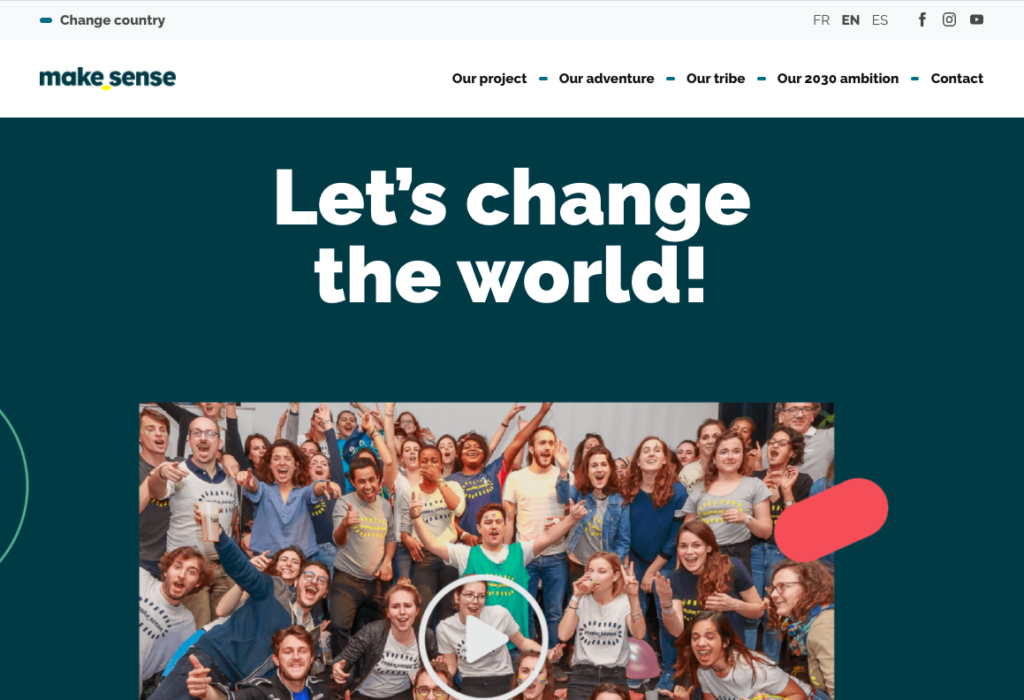
Make Sense heißt ein 10 Jahre altes und inzwischen weltweit verbreitetes Netzwerk, in dem sich vorwiegend junge Menschen gegenseitig dabei unterstützen, Sozial-Unternehmen oder ähnlich gelagerte Vorhaben zu gründen und aufzubauen. Das Netzwerk gibt an, über 8000 Unternehmensprojekte in 7 Ländern betreut zu haben und setzt sich ambitionierte Weltverbesserungs-Ziele mit seiner Power of 10-Kampagne.
*
NGOs
NGOs – also Nicht-Regierungs-Organisationen gibt es für verschiedenste gesellschaftliche Anliegen. Die Mehrzahl ist vermutlich als Verein strukturiert. Aber einige wählen auch eine unternehmerische Rechtsform. Aber auch Vereine können unternehmerisch tätig sein mit sogenannten Geschäftsbetrieben. Auch hier – mit diesem Suchansatz – kann man unter NGOs also fündig werden.
*
Patagonia, Fairphone, Shiftphone, Einhorn, vly, Mifactori
Ich will auch direkt ein paar konkrete Unternehmen rausgreifen, die ihr gesamtes oder zumindest wichtige Teile ihres Auftretens von vornherein mit Nachhaltigkeitsbotschaften verknüpfen und dabei die Grenze zum Aktivismus zuweilen überschreiten.
Patagonia – ist ein weltweit operierender Hersteller von Outdoor-Bekleidung. Die Geschichte und Kommunikation des Unternehmens ist grundlegend mit Nachhaltigkeitsthemen und -botschaften verbunden. Die Werbeplakate sind manchmal nur auf den zweiten Blick von Greenpeace-Plakaten zu unterscheiden.
Fairphone – entwickelt seit 2013 Smarphones und versucht dabei diese vollständig fair herzustellen – von der Gewinnung der Ressourcen bis hin zur Software, die das Telefon steuert. Auch die gesamte Kommunikation des Unternehmens ist auf Transparenz und Nachvollziehbarkeit ausgerichtet. Schon allein der Name des Unternehmens “Fairphone” ist eine aktivistische Botschaft.
Shiftphone – ist ein weiteres modulares und damit reparierbares Smartphone, welches ebenfalls so gut es geht fair und sozial nachhaltig hergestellt wird. Auch “Shiftphone” hat einen aktivistischen Gestus im Namen (Shift = Wandel). Shiftphone ist Gewinner des ersten deutschen Nachhaltigkeitspreises Design und die beiden Gründer nutzten ihre 30 Sekunden Redezeit in der Preisverleihung direkt auch dafür, auf das besondere Besitzermodell der Firma hinzuweisen – die Gründer werden die Firma den Mitarbeitern übergeben, wenn alles richtig läuft. “Shift” überall.
.
Einhorn – stellt “vegane und nachhaltige” Kondome und Periodenprodukte her. Das Unternehmen hat sich früh in eine erfolgreiche Petition an den deutschen Bundestag eingeklinkt, die für einen ermäßigten Mehrwertsteuersatz für Periodenprodukte warb. Das war aber nur eine Vorübung für die Aktion “Olympia – das größte Demokratie-Festival”. Dabei wurden über ein Crowdfunding 2 Millionen Euro eingeworben, um das Berliner Olympiastadion anzumieten, damit “dort Wissenschaftler*innen, demokratiefördernden Initiativen und zivilgesellschaftlichen Organisationen eine Bühne geben wird, um Lösungen für die drängendsten Probleme unserer Zeit gebündelt zu präsentieren und diese dann mit Hilfe von Petitionen direkt vor Ort zu verabschieden.” Hinter der Aktion stand, wenn auch nur halb offen, (auch) Einhorn. Die Aktion wurde vielfach kritisiert, hat es aber geschafft, in ganz Deutschland mehrere Tage lang diskutiert zu werden und gehört deshalb in diese Liste. Das Festival musste Covid-19-bedingt abgesagt werden.
(Auf die Bilder klicken zum Vergrößern)
vly – Unter neuen Getränken scheinen sich aktivistische Gesten durchzusetzen. Die Packung oben tauchte vor ein paar Tagen in meinem Supermarkt auf. Die Verpackung erinnert zu 50% an eine Klimakampagne mit Slogans wie “Klimakämpfer”, “No Milk Today” und Angaben zum CO2-Ausstoß.
Mifactori – ja, auch wir sind so ein Unternehmen. Wir sind zwar in Größe und Reichweite (noch) nicht zu vergleichen mit den oben genannten, aber wir machen unsere Arbeit, verdienen unser Geld und wachsen. Und wir sind dabei oft aktivistisch.
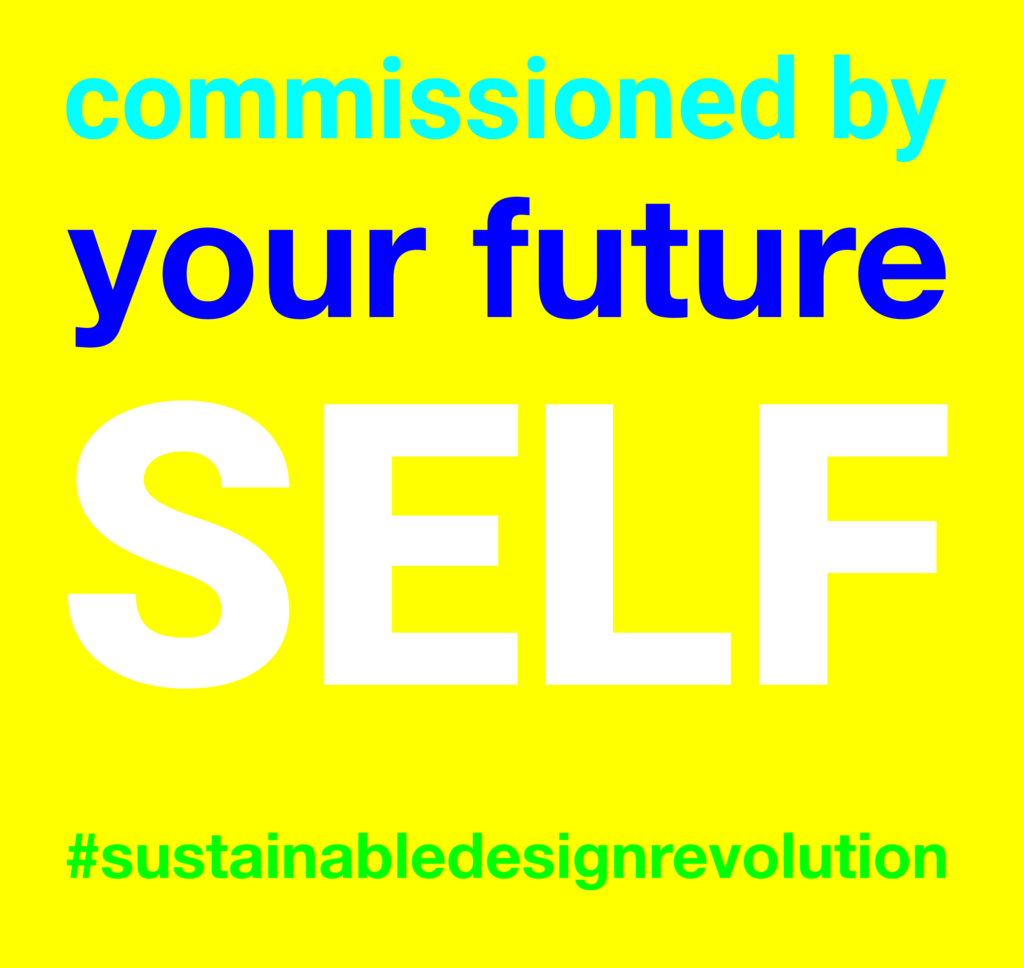
*
Siegel & Zertifikate

Siegel und Zertifikate sind ein weit verbreitetes Kommunikationsmittel in der Wirtschaft. Es gibt Siegel & Zertifikate für viele verschiedene Dinge und allein in Deutschland angeblich über 1000 Stück zu Nachhaltigkeitsthemen. Manche Siegel sind stark aufgestellt und einige Unternehmen tragen sie offen und sogar aggressiv voran durchaus mit einer aktivistischer Attitüde.
Siegel sind jedoch ein guter Ort für den Hinweis, dass offene Statements zu Nachhaltigkeit von Unternehmen manchmal auch Beispiele für Greenwashing sind – also dafür, einem Unternehmen ein nachhaltiges Image zu geben, obwohl das Unternehmen dem gar nicht gerecht wird. Die Grenze zum Aktivismus oder aktivistischen Effekten ist hier aber brüchig. So kann z.B. das Ausstellen eines grünen Leitbildes durchaus den Druck auf die gesamte Gesellschaft erhöhen, grüner zu werden. Es kann diesen Druck aber auch gerade herausnehmen, wenn etwa der Eindruck entsteht, alles sei schon auf einem guten Weg und in Ordnung. Es lohnt also ein genauerer Blick bei jeder Aktion und die Frage nach der Motivation dahinter und den tatsächlichen Wirkungen.
–
Wer noch mehr Geschichten mag, liest die Bildunterschriften oben im vorderen Teil des Artikels.
↓
Die Unternehmen aus der Beispielliste oben sind schon aktivistisch. Es müssen aber noch viel mehr werden! Und ihr Aktivismus muss noch lauter werden und sich stärker und kreativer politisch einbringen. Es gibt noch viel Spielraum für Formen und Strategien. Traut euch. Kämpft, agiert und kommuniziert für ein nachhaltigeres Morgen.
Glaubt man der Wissenschaft oder schaut auch einfach öfter mal aus dem Fenster oder in die Nachrichten, dann weiß man, dass die Zeit für das Abwenden vieler Folgen des Klimawandels schon abgelaufen ist. Für andere Folgen läuft die Zeit gerade ab. Damit wir entstandene Probleme abfedern und schlimmere abwenden können, brauchen wir Anstrengungen, die aus vielen Bereichen der Gesellschaft kommen müssen. Wir brauchen Akteure, die laut vorangehen. Und dann andere mitnehmen. Ohne Unternehmen geht es nicht. Unternehmen! Ändert eure Strategien. Seid aktivistisch. Nehmt am öffentlichen Diskurs teil.
Design-, Strategie- und Kreativagenturen! Helft ihnen dabei.
*
(ノಠ益ಠ)ノ彡┻━┻
↓
.
Was heißt das für unser Forschungsprojekt zu Open Hardware OPEN!NEXT (siehe “Vorspiel” ↑ oben)?
Wir müssen Unternehmen finden, denen es an mehr liegt als einfach nur an Geld und Macht. Open Source-Hardware ist eine Methode, die sich wunderbar eignen kann, um zirkuläre und uns auf die Herausforderungen des Klimawandels gut einstellende Produkte zu schaffen. Open Source ist ein Schlüssel zu Langlebigkeit und Anpassbarkeit. Eine wirklich smarte “Smart City” hat Open Source-Straßenlaternen. Produkte, die erfolgreich als Open Source-Produkte funktionieren, stellen in der Regel flexible Bausteine für kreative Arbeit her und keine fertigen, perfekt polierten Produkte, die allein passiven Konsum ermöglichen. Solche Produkte brauchen wir beziehungsweise eine Umgestaltung unserer Produkte in diese Richtung, um unsere Kultur resilienter und nachhaltiger zu machen.
Aber wir sollten uns nicht nur auf Unternehmen begrenzen, die bereits im weiteren Sinne aktivistisch sind, sondern auch versuchen, weiteren Unternehmen dabei zu helfen, aktivistisch(er) zu werden. Und sie z.B. dazu anhalten oder dabei unterstützen, ihre Produkte eher wie Bausteine für jedermann zu gestalten, anstatt als glitzernde Oberflächen.
Wir sollten Ihnen Open Source nicht als einen Weg für aggressives Business verkaufen, sondern als einen Weg und Beitrag für eine resiliente nachhaltigere Design- und Wirtschaftskultur.
Mit dieser Motivation werden sie in unserem Projekt glücklich und mit dieser Motivation wird auch unser Projekt glücklich und erfolgreich. Das Projekt bringt Akteure, die sich seit vielen Jahren aktiv mit Open Hardware beschäftigen, zusammen mit solchen, die darüber noch nicht viel wissen. Die meisten Leute aber, die schon länger im Feld von Open Hardware unterwegs sind, sind im Herzen Aktivisten. Sie begeistern sich für Open Hardware, weil sie darin eine Technik für eine gleichberechtigtere, nachhaltigere und interessantere Welt sehen. Sie sollten zu diesem Zeitpunkt zusammengebracht werden mit Menschen, die diese Grund-Motivation teilen. Und diese Motivation sollte in beiden angesprochen werden. Dann kann die Zusammenarbeit erfolgreich werden, und Open Source-Hardware wird vorangebracht. Dann lässt sich im übernächsten Schritt der Kreis nochmal erweitern. Aber fangt bei euren Nachbarn an.
Open Source-Hardware ist ein Mittel zu einem Ziel, kein Ziel für sich selbst. Das Ziel muss klar sein. Und es muss passen. Die ökologischen, ökonomischen und sozialen Herausforderungen, die vor uns stehen, teilen wir alle und sie geben uns klar ein Ziel vor.
↓
In diesem Artikel gibt es mehrere Bilder, die nicht von uns stammen. Deshalb gilt hier unsere Standard-Lizenz für Bilder CC-BY nicht. Ausnahmen sind die ersten beiden Bilder oben im Artikel.
. ^ .
ヽ(◕‿◕)ノ
*
English Version
–
Activist companies
Some companies sometimes act like activist – they are activist companies. Great! We need a lot more of them for the sustainable, climate-friendly reinvention of our economy. Be activist!
*
↓ Click to open
I am part of a larger European research project on open source hardware and companies. A key question is which companies to approach and how?
Open source hardware is a great way to create positive impact while building a profitable business. But when it comes to talking about aggressive growth, monopolies and extraordinary gains in wealth and power, then open source is not the most convincing flower in the bouquet. Anyone who runs a company primarily for such motives will hardly be convinced by open source and prefer to turn to other strategies. Open source requires special skills and efforts – it asks you to go the extra mile. But if it succeeds you will probably not be rewarded with extreme financial gains as perhaps others with comparable efforts will be.
Fortunately there are many business people who are not motivated by wealth and power alone. Some also work for a fairer or more sustainable world for example. Running a company is their means for this or the platform they stand on. Some even go so far with this efforts that they can already be described as “activist companies”.
I think it is these that our research project should approach and address. They might be motivated to go the extra mile because the collaborative power of open source is the more promising and effective way to achieve their goals. Our research project should find and address these companies. Or it should aim to turn companies into such companies.
And because I brought up this point – not to the liking of everyone on first sight – I was asked to explain in more detail what I mean by that. This is how this text came about, but it goes far beyond the questions of our research project.
↓

Activist Companies?
What are activist companies? It’s companies that sometimes act like activists. According to Wikipedia “activists make efforts to promote, impede, direct, or intervene in social, political, economic, or environmental reforms” (Source). So it is always about changes, either they should be brought about or they should be averted.
(Click on the pictures to enlarge them.)


!
Seen like that many companies are activist.
For example when they advertise certain lifestyles (“cars are cool”, “eating vegan is healthy”, “sustainably produced is good!”) or because they organize themselves in associations and formulate and pursue political goals there or because they just run open campaigns (see pictures above).
When civil rights activists and company representatives besiege the same MEPs in Brussels, then we call one activists and the other lobbyists but both basically do exactly the same thing.
Activist companies try to shape our society politically. In principle every company shapes our society through its goods or services. Activist companies go beyond that. They consciously formulate political goals beyond their products and then try to achieve them, for example with special forms of communication or even forms of action.
↓
Many companies use activist strategies aiming to secure money and power. When the German Axel Springer publishing group runs more or less open campaigns for a European ancillary copyright for press publishers reform, then it is about social changes that affect us all. The proposed law reshapes the public communication of our European democracies. You can decide for yourself whether the Axel Springer Group is concerned with our democracies or mainly with its own income.
But not all companies act politically solely for their financial interests. Some use their voice and position for sustainability goals. We need a lot more of them!
We need them so that they can adapt to the unavoidable consequences of climate change, biodiversity collapse and resource depletion and to avert even worse consequences; We need them as offensive actors for a constructive sustainable rebuilding of our economy.
Business people also have children and grandchildren and many want to leave them a world that allows a good life in peace. Some of these business people are already fighting loudly for it. But there can be a lot more and everything can be louder. Be activist. Bravely.
Even when it’s tough.
.
Soccer star Mesut Özil tweeted about China’s detention of Uighurs and then things fell apart. A must read as we see how sports bodies deal with China, from the NBA to the Olympics. Sports IS political — always has been, as @MinkysHighjinks would attest. https://t.co/6crzujzTIh
— Melissa Chan (@melissakchan) October 27, 2020

↓
Perhaps it is still not entirely clear what activist companies are supposed to be, how they can do good and what various shapes and forms they can take. So I’ll just write down a few examples here. The list is neither exhaustive nor does it reflect all existing or conceivable forms of activism by companies. It’s just a beginning.
*
Social Entrepreneurship
“Social Entrepreneurship” is a catchphrase that has been around for many years:
“Social entrepreneurship (…) is understood to mean an entrepreneurial activity that aims to be innovative, pragmatic and long-term for the solution of social problems or, more generally, for a significant, positive change in society.” (Wikipedia)
Many companies refer to themselves as social enterprises, so you can find them using this search term. In Germany there is even an association for social enterprises with 450+ members and entire portals and magazines that are explicitly aimed at social enterprises.
*
The common good economy
.
The Economy for the Common Good is a social movement founded by the former ATTAC activist Christian Felber.
“Since the (…) project came into being, around 2000 companies (…) have joined according to their own statements.” (Wikipedia)
The core of the movement is that the companies involved draw up and publish a “public good balance sheet”. This includes criteria such as human dignity, solidarity, justice, ecological sustainability, transparency and codecision. Further political demands are linked to the public interest balance (e.g. possible tax relief for companies accounted for in the public interest).
*
Make Sense

Make Sense is the name of a 10-year-old network that is now spread around the world in which mainly young people support each other in founding and developing social enterprises or similar projects. The network claims to have supported over 8000 corporate projects in 7 countries and is setting itself ambitious world improvement goals with its Power of 10 campaign.
*
NGOs
NGOs – i.e. non-governmental organizations – exist for a wide variety of issues. The majority are probably structured as an association. But some also choose legal form that is closer to a business or have parts that are a business. Here too – with this search approach – you’ll find “activist companies”.
*
Patagonia, Fairphone, Shiftphone, Einhorn, vly, Mifactori
I also want to pick out a few specific companies that link their entire or important parts of their public appearance with sustainability messages and sometimes cross the line to activism.
Patagonia – is a global manufacturer of outdoor clothing. The company’s history and communication are fundamentally linked to sustainability issues and messages. The advertising posters can sometimes only be distinguished from Greenpeace posters at second glance.
Fairphone – has been developing smartphones since 2013 and tries to manufacture them completely fairly – from the extraction of resources to the software that controls the phone. The entire communication of the company is also geared towards transparency and traceability. The company’s name “Fairphone” alone is an activist message.
Shiftphone – is another modular and thus repairable smartphone, which is also produced as well as possible in a fair and socially sustainable manner. “Shiftphone” also has an activist gesture in its name. Shiftphone is the winner of the first German sustainability award for design and the two founders used their 30 seconds speaking time in the award ceremony to draw attention to the company’s special ownership model – the founders will hand the company over to the employees at some point. “Shift” everywhere.
.
Einhorn – makes “vegan and sustainable” condoms and period products. The company got involved in a successful petition to the German Bundestag which campaigned for a reduced VAT rate for period products. But that was only a preliminary exercise for “Olympia – the largest democracy festival”. Crowdfunding was used to raise 2 million euros to rent the Berlin Olympic Stadium so that “scientists, democracy-promoting initiatives and civil society organizations will be able to present solutions to the most pressing problems of our time and then the audience will agree on them and sign a petition for each of them on sight.” Behind the action stood also Einhorn. The action was criticized many times, but managed to be discussed for several days all over Germany and therefore belongs on this list. The festival had to be canceled due to Covid-19.
(Click on the pictures to enlarge)
.
vly – Activist gestures seem to be gaining ground among new drinks. The package above showed up in my supermarket a few days ago. 50% of the packaging is reminiscent of a climate campaign flyer with slogans such as “Climate fighters”, “No Milk Today” and information on CO2 emissions.
Mifactori – yes, we are such a company too. We cannot (yet) be compared to the above in terms of size and range, but we do our job, earn our money and grow. And we are often activist.

*
Seal & Certificates

Seals and certificates are a common means of communication in business. There are seals and certificates for many different things and in Germany alone there are supposedly over 1000 on sustainability issues. Some seals are well established and some companies present them openly and sometimes even aggressively with an activist attitude.
However, seals are a good place to point out that open statements on corporate sustainability are sometimes also examples of greenwashing – giving a company a sustainable image unjustified. The border to activism or activist effects is flexible here. For example, issuing a green mission statement can certainly increase the pressure on society as a whole to become greener. It can also take this pressure off, for example, if the impression arises that everything is already on the right track and well in order. It is therefore worth taking a closer look at each action and asking about the motivation behind it and the actual effects.
–
If you want more stories read the image captions above.
↓
The companies in the example list above are already activist. But there must be a lot more! And their activism has to get louder and get involved more and more creatively in politics and public discussions. There is still a lot of leeway for forms and strategies. Be brave. Fight, act and communicate for a more sustainable tomorrow.
If you believe science or just look out the window or at the news then you know that the time to avert many of the consequences of climate change has already run out. And even more consequences are at the horizon. Many of them we can still avert. We need efforts from many areas of society. We need actors who go ahead loudly. And then take others with them. It doesn’t work without companies. Companies! Change your strategies. Be activist. Become actors of and advocates for change.
Design, strategy and creative agencies! Help them.
*
(ノ ಠ 益 ಠ) ノ 彡 ┻━┻
↓
.
What does this mean for our research project on Open Hardware OPEN!NEXT (see “Prelude” ↑ above)?
I think we should aim to find companies that care about more than just money and power. Open source hardware is a method that can be wonderfully suited to creating circular products that are well adapted to the challenges of climate change. Open source is a key to longevity and adaptability. A really smart “smart city” has open source street lights. Products that function successfully as open source products usually produce flexible building blocks for creative work rather than finished, perfectly polished products that enable only passive consumption. We need such products or a redesign of our products in this direction in order to make our culture more resilient and sustainable.
But we should not limit ourselves only to companies that are already activist, but also try to help other companies to become (more) activist. And encourage them, and help them (re)design their products more like building blocks for everyone, rather than as glittering surfaces.
We shouldn’t sell open source as a way for aggressive business, but as a way and contribution to a resilient, more sustainable design and business culture.
With this motivation companies will be happy in our project and with this motivation our project will also be happy and successful. The project brings together actors who have been actively involved in open hardware for many years with those who do not yet know much about it. But most of the people who have been in the field of open hardware for a long time are activists at heart. They are enthusiastic about open hardware because they see in it a way to a more equal, more sustainable and more interesting world. At this point they should be brought together with people who share this basic motivation. And that motivation should be sparked in both. Then the collaboration can be successful and open source hardware makes progress. We can make the circle bigger later on. But start with your neighbours.
Open source hardware is a means to an end, not an end in itself. The goal must be clear. And it has to fit. We all share the ecological, economic and social challenges that stand before us and they give us a clear goal.
↓
There are several images in this article that are not ours. Therefore our standard license for CC-BY images does not apply here. Exceptions are the first two pictures above in the article and the one there ↓
. ^ .
ヽ(◕‿◕)ノ
–
